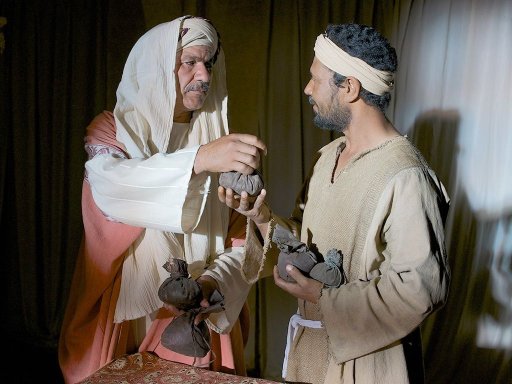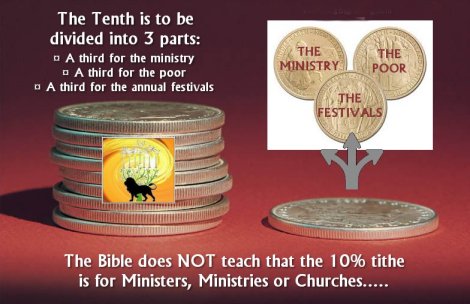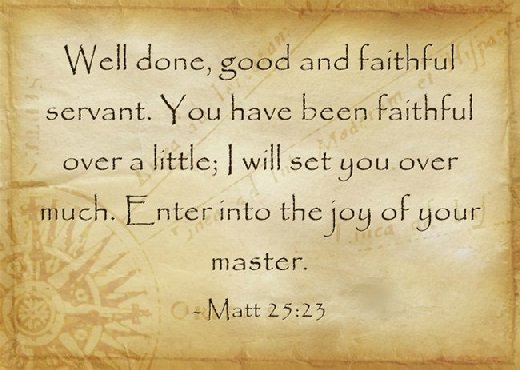
Biblical stewardship may be defined, in its broadest sense, as "the utilisation and management of all resources Yahweh provides to, and for, man for the glory of Elohim (God) through the maintenance and betterment of creation". Stewardship, moreover, implies some sort of accountability. Scripture teaches that believers are not only accountable to Yahweh for all their thoughts and deeds but that they have a stewardship in, and to, the Messianic Community/Family (Church) too. This accountability is administered by the Melchizedek Priesthood Order of the Chavurat Bekorot of each local and metropolitan congregation.
The Basic Law of Stewardship
One of the principles of the Besorah (Gospel) is the law of stewardship which has to do with individual responsibility for sharing systematically and proportionately your time, talent, and treasure in the service of Yahweh, the Messianic Community and for the benefit of mankind. The New Covenant Torah principle is premised upon several principles:
- 1. Yahweh's ownership of all He has created;
- 2. Yahweh's authority over all His creatures;
- 3. The bestowal of life, talent, and treasure upon mankind who is to act as a steward over it;
- 4. The increase of that which is bestowed, through the process of righteousness; and
- 5. Accountability to Yahweh for management of stewardship in this life and in the æons of time to come.
Underlying this law is the love of Elohim (God) and His eternal purposes. It is through it that man may make good his claim of love for Yahweh, his brethren and his fellowman. It is in relation to this law that man is judged and rewarded. If treated casually or indifferently, it does not bring forth its full fruit. Through it, believers may express their faith in Elohim (God), make teshuvah (repent) from dead living, and enlist his life in the greatest cause of all - building the Kingdom of Elohim (God) on earth.
Stewardship Established
In the beginning, when mankind was given place upon the earth, Yahweh blessed him and said:
"Be fruitful and multiply; fill the earth and subdue it; have dominion over the fish of the sea, over the birds of the air, and over every living thing that moves on the earth" (Gen.1:28, NKJV).
It is at this point that the stewardship of man was bestowed and its principles began to be revealed.
Yahweh-Elohim is the creator of all; He is the owner of all. He is the source of all life, light, truth, and substance. Nothing exists but that which was made by Him, and without Him was nothing made. He has never relinquished that ownership. Instead, He has appointed man to be manager of what has been entrusted to his care: life, light, truth, and substance.
1. The Stewardship of Life
Man is given stewardship over his own life which implies - agency in its turn implies responsibility - responsibility to act righteosly. It is through obedience to Yahweh's mitzvot (commandments) that man is able to order his life in righteousness. Every man who enlists in the Kingdom of Messiah finds himself under the stewardship of the principle of increase - the constraint to make his life fruitful through skillful service. It is through service that he grows and through growth that he is able to serve the best.
The principle of increase demands self-control - a mastery of himself. But the man who is able to master himself must also master human relationships. These two processes go on simultaneously and one cannot succeed without the other.
As we place ourselves under subjection, controlling our desires and wishes so they are channeled into the areas Elohim (God) has revealed to be most fruitful, we gain self-mastery. Halfway measures will not satisfy us - we can be satisfied only with complete mastery. But, as we come to know ourselves, we find that we are inalterably linked with others. We learn that no man truly knows himself well who does not know himself in the gambit of human society. In the realm of social action and interaction he comes to be refined in the crucible of the wholeness of life.
But this life is not whole until we come to know our fellowman and ourselves in relationship to Elohim (God). We must see and understand and adhere to the principles of Yahweh as revealed "from the creation of the world...being understood by the things that are made, even His eternal power..." (Rom.1:20, KJV).
In this stewardship, responsibility comes to the fore. Man is without excuse because when he was created in the image of Elohim (God), he was given agency which requires him to deliberate and decide in life. He is a living soul, a person who is capable of deliberative choosing. He is separated from other creatures and things which are acted upon in that he is free to act upon the result of his deliberation.
All of Scripture testifies of the fact that Elohim (God) expects us to measure up to His plans for us. In His grace - His undeserved loving-kindness or unmerited favour - He goes out of His way to help us succeed. He expects us to make our lives worth something, and we are so wonderfully made that we will forever be restless until we achieve that goal.

2. The Stewardship of Time
Time is the essence of the measure of our span upon the earth. We measure it in terms of hours and minutes, weeks and days, years and months, until we have measured a lifetime from the cradle to the grave. It is in terms of this chronology that we mete out many loyalties, allotting a certain amount of time for gainful employment, other time for leisure, and still other time for rest. We time our meetings, vacations, and our journeys. The reason for this is that life is very precious to us, and we seek to use it systematically to its best advantage.
As stewards of Elohim (God) we will still use our time to its fullest. We will not waste it, for once spent it may not be recovered. It may be extended through investment, and herein lies the mystery wherein though we live we may die and in death we may live. Time wasted or invested in carnal things dies. Time invested in eternal values, though it becomes past (dead), shall live through its eternal heritage.
There are certain times or appointments (moedim) which Yahweh says are to be used exclusively for Him. These times are not for us to do with as we wish and include the weekly sabbath, the monthly new moon, and the seven annual festivals, which are to be exclusively devoted to His service in assembly. Other times, in which we are required to do certain things, include the seven-yearly sabbatical year and the fifty-yearly jubilee. All of these require that we put aside personal interests and devote them together in corporate fellowship with other believers.
In a very real sense, a spiritually-regenerated, born-again believer devotes all his time to Yahweh. The aforementioned moedim are constants common to the whole Messianic Community (Church). The rest of our time is to be used in His service, directly or indirectly, as we are led and guided by the Ruach haQodesh (Holy Spirit) for self, family, and the Kingdom. Devoting time, therefore, to regular prayer and scripture study is therefore essential to train the believer up to both fellowship with Elohim (God) and to know His will at all times.

3. The Stewardship of Talent
The parable of the talents (Mt.25:14-30) has to do with money. It is only through the symbolic nature of money that we can see basic truth involved which may be applied to all of life's facets. Money represents time. It takes a certain amount of our precious time for us to be able to have it. That is why he who steals money commits a greater wrong than simply taking a piece of property - he has stolen someone's life. He who spends money unwisely is guilty of unwise stewardship of life. We are stewards over our money (OB 97:22-26)
Since money is so closely related to life itself, the parable of the talents may become a symbol of more than property - it may be a symbol of our talents and skills too. The admonition to become fruitful carries with it the responsibility for every steward to expand his skills into many rather than a few. Yahweh does not want us to be stagnant. On the other hand, just as a pear tree bears pears and a currant bush bears currants, we must not neglect the skills we already have. We are expected to make the most of a talent or skill with is Yahweh's gift to us, whether it be one or many.

4. The Stewardship of Yahweh's Mysteries - His Gospel
Paul, writing to the Corinthians, referred to "stewards of Elohim's (God's) mysteries" (1 Cor.4:1, NRSV). However, these are not 'mysteries' to the qodeshim (saints, set-apart ones, believers) but are mysteries only to those who do not know the way of Elohim (God) the Father and His Son.
These mysteries of which Paul writes are caught up in the term 'gospel' (besorah, good news). We have a stewardship over this, not only to assimilate the gospel in our own lives but to share it with others. Just as we are unable to exercise full stewardship over our own lives without taking others into consideration, so is this stewardship intertwined with the necessity to evangelise the world. This is a very important part of our stewardship for it is basic to our spiritual health individually and collectively.
To this may be added the time needed to train and act within the ministry for we all are called to be servants of the Kingdom in the Royal Messianic (Melchizedek) Priesthood (OB 110). Parents are stewards of the families and husbands of their wives (OB 47:15-17). The Messianic Evangelical work is itself an apostolic stewardship (OB 259:13-14) to the founder and to all those called to serve in it with him and his successors (OB 116); all must give an account of their individual stewardships within it (OB 192:19; 142:26-27).

5. The Stewardship of Things
It is hard to measure stewardship in the realm of life, time and talent. In this, the individual must come to grips with reality in order to satisfy himself and Yahweh. No man can tell another exactly how much time he should spend in any given areas of service, nor can a man accurately determine the degree of any other man's consecration.
It is in the realm of 'things' that we sometimes seek to recognise a greater or lesser degree of consecration and stewardship. In a larger sense, this, too, is an impossible task, for none of us are able to determine with any degree of exactness how much of the 'things' of life are required to carry on any given stewardship.
In another sense, however, there is one criterion to which we may turn to recognise the token of obedience, if not the degree. Every steward shall make consecration of some part of his life to the cause of Elohim (God), mankind and indeed of nature itself (OB 196:28-31). This applies to his time, his talent, and his treasure.
6. The Financial Law
As part of the stewardship plan, the financial law comes into focus. Concerning the manner in which we shall make our financial accounting before Yahweh, we are commanded to accede to the rendering of the Priesthood.
We should keep clearly in mind, however, that financial accounting is related to the whole law of stewardship. We are accountable not only to paying our indebtedness to Yahweh (the tithe) but are equally accountable for the total treasure entrusted to our hands. The mind is focussed not only upon the increase but upon the total income. We are accountable to Yahweh for the manner in which we use our income for food. clothing, housing, investments, and health just as we are for the determination of that portion of the increase which is rendered as tithing. This increase, in the local asseemblies or congregations, is of both income and inheritance (a third of a tenth being paid to the ministry, a third to the poor, and a third in providing for the festivals) and of total wealth upon entering the Kingdom. Within firstborn communities the united order (or financial law of all things in common) applies.

The man who is wantonly extravagant, whether it is for exotic foods, overly ornate housing, or superficial pleasures, stands condemned before the throne of grace by the law of stewardship which calls up as witness against him the hungry, the naked, and lost souls whose needs are so great but who receive so little. He who makes no provision for systematic and proportional sharing of his time, talent, and treasure in the service of Elohim (God) and for the benefit of mankind is guilty of the supreme conceit - selfish neglect.
The man who lives his stewardship well will find himself blessed in ways the world cannot understand. There is no promise that he shall become a rich and powerful man as the world measures, but there is a promise that he shall gain the love of his fellowman and favour in the sight of Elohim (God). This is an accumulation of riches no man can steal and no misfortune can take away - a promise so great that the gates of hell shall not prevail against it.
Summary
The basic law of stewardship, of which this is just a summary, recognises the following:
- 1. Yahweh owns all He has created;
- 2. Yahweh has authority over His creation;
- 3. Man has management responsibility (stewardship);
- 4. Every steward is to be fruitful; and
- 5. Accountability is for this life and the next.

| 

